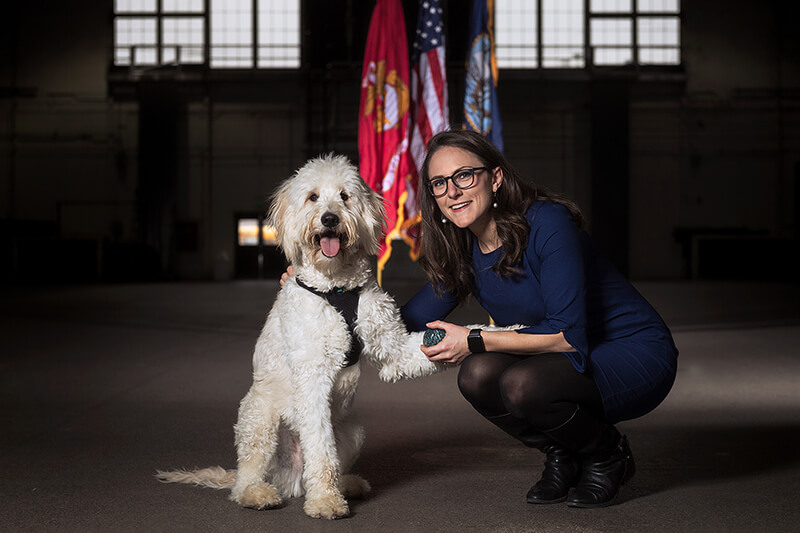October 10, 2019
Photo gallery highlights Purdue’s Giant Leaps research
 Maggie O’Haire, associate professor of human-animal interaction, is leading research that shows how service dogs can benefit veterans experiencing PTSD. (Purdue University photo/Rebecca Wilcox)
Download image
Maggie O’Haire, associate professor of human-animal interaction, is leading research that shows how service dogs can benefit veterans experiencing PTSD. (Purdue University photo/Rebecca Wilcox)
Download image
WEST LAFAYETTE, Ind. — How will astronauts manage nourishment and medication to survive long ventures in space? Humans and computers interact daily, so why do jokes fall flat for Alexa and Siri? Can service dogs help veterans with PTSD live healthier lives?
These are just a few of the world’s challenges that Purdue scientists are trying to solve.
Purdue’s sesquicentennial anniversary has been centered on the theme, “Giant Leaps,” highlighting Purdue’s history of giant leaps and the leaps the university is taking to address these challenges. This past year, Purdue highlighted a few scientists who focus on the Giant Leaps themes: Space - Earth, Exploration and Economics; Artificial Intelligence, Algorithms and Automation - Balancing Humanity and Technology; Health, Longevity and Quality of Life; and Sustainable World- Innovate Today for a Sustainable Tomorrow. Here is a photo and video gallery highlighting those research profiles.
Here are some of the featured research profiles:
* Can we collect orbital debris left in Earth’s atmosphere and orbit? David Spencer, an associate professor of aeronautics and astronautics at Purdue, is researching a system to address space junk created by defunct satellites and debris spacecraft. He is developing a drag sail system that would launch with space-bound satellites and clean up the orbits before they are unusable. Check out the story, “Bringing ‘space trash’ safely back to Earth,” here.
* Humans and computers interact daily, so why do jokes fall flat for Alexa and Siri? Julia Rayz, an associate professor and assistant department head in Department of Computer and Information Technology in Purdue’s Polytechnic Institute, is trying to get artificial intelligence to understand humans’ humor; why something is funny or not? Check out the story, “Alexa, why don’t you laugh at my jokes,” here.
* Can service dogs help veterans with PTSD live healthier lives? Maggie O’Haire, an associate professor of human-animal interaction in the Purdue College of Veterinary Medicine, has been leading research that helps quantify the benefits of a service dog to veterans’ physiology and behavior. Her preliminary study showed that overall symptoms for post-traumatic stress disorder were lower among war veterans with service dogs. Check out the story, “How do we know service dogs help veterans with PTSD,” here.
* How will astronauts manage nourishment and medication to survive long ventures in space? Alina Alexeenko, a professor of aeronautics and astronautics, is researching lyophilization, also called freeze drying. Lyophilization uses a sterile, vacuum environment to remove water from products after they are frozen. Possible uses for the freeze-drying process include in space and pharmaceuticals. Check out the story, “Because there are no pharmacies in space,” here.
* What can our weather now tell us about the effects of climate change? Dan Chavas, an assistant professor of atmospheric science at Purdue, is researching the capabilities of extreme weather, specifically hurricanes, in order to predict how storms will change in Earth’s impeding climate. In his research, he uses two computer models to simulate storms. One model is of present-day Earth, while the other is a highly simplified version of Earth, where there is no land. Check out the story, “To understand climate change, we need to understand weather now,” here.
The 150th anniversary celebration began during Homecoming 2018 and will conclude with an astronaut reunion on Saturday (Oct. 12) during Homecoming 2019.
Writer: Madison Sanneman, msannema@purdue.edu
Media Contact: Amy Patterson Neubert, 765-494-9723, apatterson@purdue.edu

